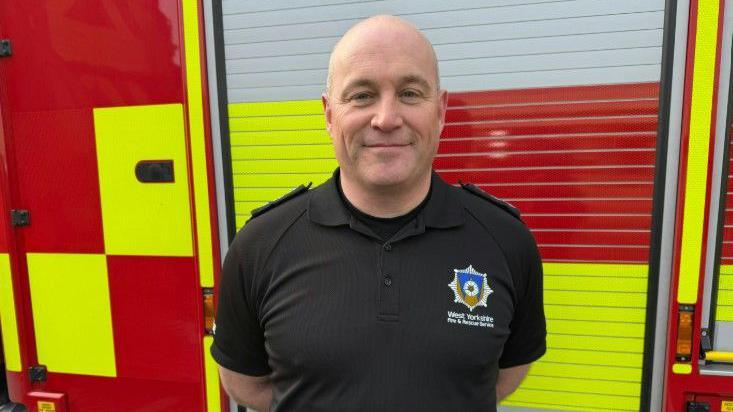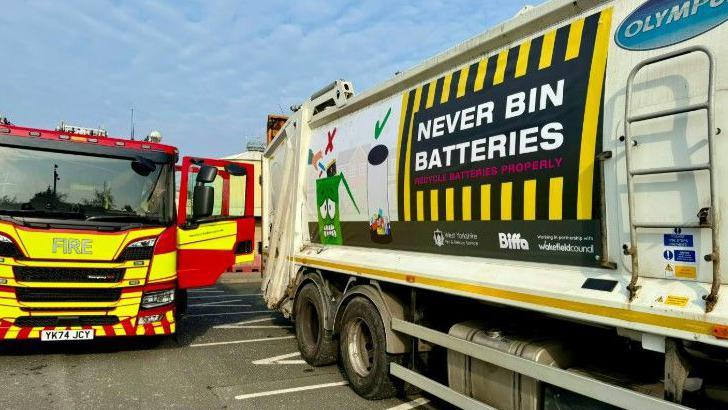Battery bin plea as fire numbers increase

West Yorkshire Fire and Rescue's Assistant District Commander David Burland said battery fires are preventable
- Published
A senior West Yorkshire fire officer has warned about disposing batteries in household bins amid what the force described as a "growing national crisis".
Lithium-ion batteries, commonly found in everyday items such as vapes, mobile phones and power tools, are increasingly causing fires when discarded incorrectly, West Yorkshire Fire and Rescue Service (WYFRS) said.
In Wakefield alone, almost 85 tonnes of electrical items were incorrectly placed in recycling bins last year, leading to 46 fires at one rubbish sorting site as well as five bin lorry blazes.
WYFRS Assistant District Commander David Burland said: "These avoidable fires are also taking away resources from other emergencies."
"Lithium-ion batteries are everywhere, more places than you realise," he said.
"And if you throw one in a standard household bin, when your bin wagon collects waste, it compacts it and the danger starts when the lithium-ion batteries are crushed or damaged.
"They can instantly burst into flames due to the chemicals inside them," Mr Burland added.
Despite being small and portable, lithium-ion batteries have a high energy and power density so when not made correctly, can exhibit "thermal runway" - a self-heating state that can result in them ejecting gas, shrapnel and extremely high temperatures leading to fires.
Watch: CCTV footage of fires caused by incorrectly disposed batteries
WYFRS has launched a campaign, alongside Wakefield Council and waste management firm Biffa, to raise awareness about the dangers of disposing of all batteries.
Many libraries and supermarkets have special recycling boxes for batteries and council websites can offer advice about disposal too.
Mr Burland also warned about the dangers of buying battery packs online - often to convert standard pedal bikes to e-bikes.
He said it was especially risky to charge an e-bike indoors, particularly in house shares or flats where space was at a minimum.
"Try and charge them somewhere safely away from your property if possible.
"Do not block your escape route overnight, because that could be the difference in you getting out or not," he added.

There a various waste disposal sites across the region for batteries
A man died in Bradford after his converted e-bike caught fire while charging in the living room overnight at his home.
Mohsin Janjua, 28, was found unresponsive in a bedroom in December 2023 after he returned to the fire-engulfed house because he thought his brother was still inside.
A coroner said the blaze was likely caused by a "catastrophic failure" of the bike battery.
A Prevention of Future Deaths report has since been released urging the government to examine rules around the sale of lithium-ion battery kits - which are unregulated.
The Product Regulation and Metrology Act 2025 , externalwas recently passed which enabled the government to "address challenges" arising from technological advances such as the fire risk associated with e-bikes and lithium-ion batteries.
Mr Burland said buying battery kits online had increased as they were cheap.
"But that cost is at a bit of a price to safety as well.
"Some government regulation of how these batteries are tested before being sold to make sure they fit to British standard trademarks is needed," he said.
Mr Burland added: "That could be a good place to start."
Get in touch
Tell us which stories we should cover in Yorkshire
Listen to highlights from West Yorkshire on BBC Sounds, catch up with the latest episode of Look North.
- Published17 May
- Published11 October 2024
